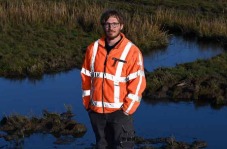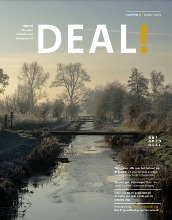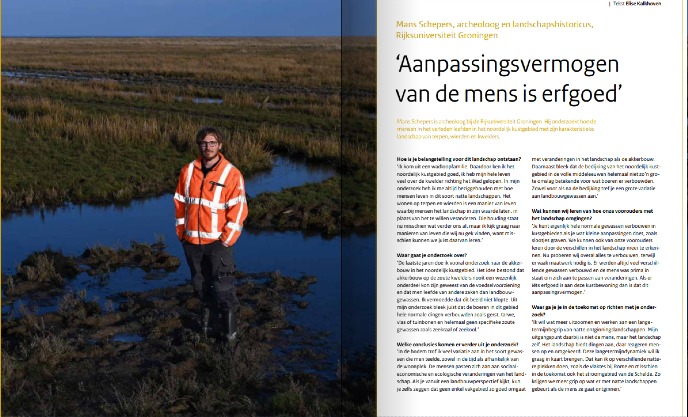‘Dyking the northern coastal area in the Middle Ages did not produce such a massive change in what farmers cultivated.’ Interview with archaeologist Dr Mans Schepers

Where did your interest in this landscape come from?
‘I’m from a family of Wadden walkers. It means I know the northern coastal area really well, I spent my entire life walking on salt marshes towards the Wadden. In my research I always looked at how people live in these types of wet landscapes. Living on terp mounds and dwelling mounds is a way of life where people leave the landscape to its own devices rather than aim to conquer it. That attitude may be far removed from the way we think today, but I like to look at ways of life we find strange now because they offer something we can learn from.’
What is your research about?
‘In recent years, I have largely conducted research into arable farming in the northern coastal area. There was this notion that arable farming in salt marshes could never have been an essential part of food provision, and that people lived on things other than arable crops. I suspected that this picture was not correct. My research demonstrated that farmers in this area cultivated completely normal crops, including barley, wheat, flax or broad beans, and not specifically salt crops, such as marsh samphire or sea kale.’

This interview was published in the magazine Deal! Erfgoed. The original interview is available here.Text: Elise Kalkhoven, photos: Els Zwerink
What are the other conclusions of your research?
‘In the soil I found a wide variety of the types of crops they farmed, in terms of that era and that location. People adapted to socio-economic and ecological changes in the landscape. Taken from an agricultural point of view, you could say that few other disciplines match the way arable farming deals with changes in the landscape. It also demonstrated that dyking the northern coastal area in the High Middle Ages did not produce such a massive change in what farmers cultivated. You find a wide range of arable crops before and after dyking.’
Dr Mans Schepers is an archaeologist at the University of Groningen and Fellow of the Sustainable Landscapes theme of the Rudolf Agricola School for Sustainable Development. He studies how people in the past lived in the northern coastal area with its typical landscape of terp mounds, dwelling mounds, and salt marshes.
What can we learn from the way our ancestors dealt with the landscape?
‘You can actually cultivate completely normal crops in coastal areas if you add a few modifications, such as digging ditches. We can also learn from our ancestors by acknowledging the differences in the landscape more readily. These days we try to cultivate everything everywhere, when a customised approach is what is actually required. They always cultivated many different crops, and humans were perfectly able to adjust to the changes. If there is any heritage in coastal living, it is this ability to adjust.’
What will be the future focus of your research?
‘I want to zoom out a little and work on a long-term understanding of wet reclamation landscapes. My starting point will not be mankind, but the landscape itself. The landscape offers many things that people respond to and vice versa. I would like to chart this long-term dynamic. That can be done in various wetland areas, such as the flats near Rome, and in future perhaps even the Scheldt delta. It will give us more grip on what actually happens to wet landscapes when people start to reclaim them.’
Read more - scientific articles by Mans Schepers:
A scientific article is under preparation that will provide scientific support for the conclusions highlighted in this interview
Wetland Reclamation and the Development of Reclamation Landscapes: a Comparative Framework. By: Tymon de Haas and Mans Schepers, in: Journal of Wetland Archaeology.

| Last modified: | 02 June 2023 2.31 p.m. |
More news
-
24 March 2025
UG 28th in World's Most International Universities 2025 rankings
The University of Groningen has been ranked 28th in the World's Most International Universities 2025 by Times Higher Education. With this, the UG leaves behind institutions such as MIT and Harvard. The 28th place marks an increase of five places: in...
-
05 March 2025
Women in Science
The UG celebrates International Women’s Day with a special photo series: Women in Science.
-
16 December 2024
Jouke de Vries: ‘The University will have to be flexible’
2024 was a festive year for the University of Groningen. In this podcast, Jouke de Vries, the chair of the Executive Board, looks back.

